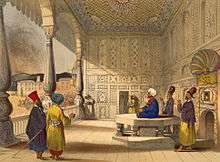Kingdom of Afghanistan
| Kingdom of Afghanistan | ||||||||
| د افغانستان واکمنان Dǝ Afġānistān wākmanān پادشاهي افغانستان, Pādešāhī-ye Afġānistān | ||||||||
| ||||||||
| ||||||||
.svg.png) | ||||||||
| Capital | Kabul | |||||||
| Languages | Pashto, Persian | |||||||
| Religion | Sunni Islam | |||||||
| Government | Constitutional monarchy | |||||||
| King | ||||||||
| • | 1926–1929 | Amanullah Khan | ||||||
| • | 1929 | Inayatullah Khan | ||||||
| • | 1929 | Habibullāh Kalakāni | ||||||
| • | 1929–1933 | Mohammed Nadir Shah | ||||||
| • | 1933–1973 | Mohammed Zahir Shah | ||||||
| Prime Minister | ||||||||
| • | 1929–1946 | Mohammad Khan (first) | ||||||
| • | 1972–1973 | Mohammad Shafiq (last) | ||||||
| Legislature | Loya Jirga | |||||||
| Historical era | Interwar Period · Cold War | |||||||
| • | Succeeds Afghan emirate | 9 June 1926 | ||||||
| • | Monarchy abolished | 17 July 1973 | ||||||
| Area | ||||||||
| • | 1973 | 647,500 km² (250,001 sq mi) | ||||||
| Population | ||||||||
| • | 1973 est. | 11,966,400 | ||||||
| Density | 18.5 /km² (47.9 /sq mi) | |||||||
| Currency | Afghan afghani | |||||||
| ||||||||
| Today part of | | |||||||
The Kingdom of Afghanistan (Pashto: د افغانستان واکمنان, Dǝ Afġānistān wākmanān; Persian: پادشاهي افغانستان, Pādešāhī-ye Afġānistān) was a constitutional monarchy in southern and central Asia established in 1926 as a successor state to the Emirate of Afghanistan. It was proclaimed by its first king, Amanullah Khan, seven years after his accession to the throne.
Amanullah Khan was keen on modernizing the country, resulting in conservative forces causing social upheaval on a number of occasions. When he was visiting Europe in 1927, rebellion broke out again. He abdicated in favour of his brother Inayatullah Khan who only ruled for three days before the leader of the tribal rebellion Habibullah Kalakani took power and reinstated the Emirate.
After 10 months, Amanullah Khan's Minister of War, Mohammed Nadir, returned from exile in India. His British-supported armies sacked Kabul, forcing Habibullah Kalakani to discuss a truce. Instead, Mohammed Nadir's forces apprehended and subsequently executed Kalakani. Mohammed Nadir reinstated the kingdom, was proclaimed King of Afghanistan in October 1929, and went on to revert the reformist path of the last king, Amanullah Khan. He was succeeded by his son, Mohammed Zahir Shah, whose rule started in 1933 and lasted for 39 years. Mohammed Zahir Shah, the last King of Afghanistan, was eventually overthrown by his own cousin Mohammed Daoud Khan who successfully ended the centuries-old monarchy and established a republican Afghan government. It was under the leadership of Zahir Shah that the Afghan government sought relationships with the outside world, most notably with the Soviet Union, United Kingdom and the United States.[1]
On 27 September 1934, during the reign of Zahir Shah, the Kingdom of Afghanistan joined the League of Nations. During World War II, Afghanistan remained neutral and pursued a diplomatic policy of non-alignment. Mohammed Daoud Khan, Prime Minister of Afghanistan at the time, worked hard for development of modern industries, and education in the country.[2]
See also
- Barakzai Dynasty
- European influence in Afghanistan
- List of Sunni Muslim dynasties
- Reforms of Amanullah Khan and civil war
References
- ↑ Rubin, Barnett. "DĀWŪD KHAN". In Ehsan Yarshater. Encyclopædia Iranica (Online ed.). United States: Columbia University. Retrieved January 2008. Check date values in:
|access-date=(help) - ↑ "History of Afghanistan". History of Afghanistan. Retrieved 2009-03-20.
.svg.png)
.svg.png)
